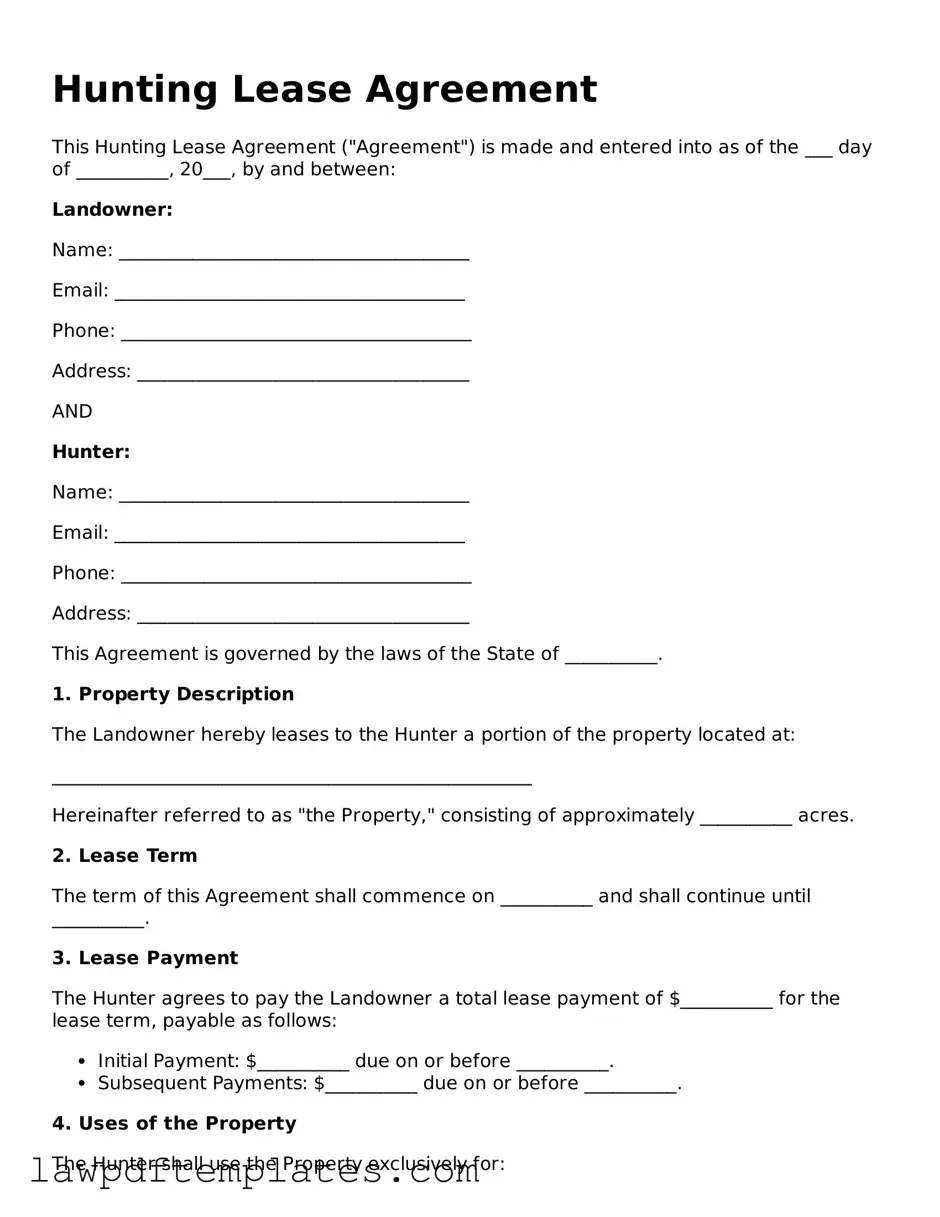Attorney-Approved Hunting Lease Agreement Document
Form Breakdown
| Fact Name | Description |
|---|---|
| Purpose | A Hunting Lease Agreement outlines the terms under which a landowner allows individuals to hunt on their property. |
| Parties Involved | The agreement typically involves the landowner (lessor) and the hunter or hunting group (lessee). |
| Governing Law | In many states, the agreement is governed by local property and contract laws, which can vary significantly. |
| Liability Considerations | It often includes clauses addressing liability, ensuring that both parties understand their responsibilities and risks. |
Sample - Hunting Lease Agreement Form
Hunting Lease Agreement
This Hunting Lease Agreement ("Agreement") is made and entered into as of the ___ day of __________, 20___, by and between:
Landowner:
Name: ______________________________________
Email: ______________________________________
Phone: ______________________________________
Address: ____________________________________
AND
Hunter:
Name: ______________________________________
Email: ______________________________________
Phone: ______________________________________
Address: ____________________________________
This Agreement is governed by the laws of the State of __________.
1. Property Description
The Landowner hereby leases to the Hunter a portion of the property located at:
____________________________________________________
Hereinafter referred to as "the Property," consisting of approximately __________ acres.
2. Lease Term
The term of this Agreement shall commence on __________ and shall continue until __________.
3. Lease Payment
The Hunter agrees to pay the Landowner a total lease payment of $__________ for the lease term, payable as follows:
- Initial Payment: $__________ due on or before __________.
- Subsequent Payments: $__________ due on or before __________.
4. Uses of the Property
The Hunter shall use the Property exclusively for:
- Hunting.
- Related recreational activities.
5. Compliance with Laws
The Hunter agrees to comply with all local, state, and federal laws regarding hunting and the use of the Property.
6. Indemnification
The Hunter agrees to indemnify and hold the Landowner harmless from any claims, damages, or liabilities arising from the Hunter's use of the Property.
7. Termination
This Agreement may be terminated by either party upon providing written notice of at least __________ days.
8. Governing Law
This Agreement shall be governed by the laws of the State of __________.
IN WITNESS WHEREOF, the parties have executed this Hunting Lease Agreement as of the date first above written.
Landowner Signature: _____________________________ Date: __________
Hunter Signature: _____________________________ Date: __________
Common mistakes
Filling out a Hunting Lease Agreement form is an important step in securing hunting rights on a property. However, many individuals make common mistakes that can lead to misunderstandings or legal issues. One frequent error is failing to clearly define the lease term. A vague start and end date can create confusion about when hunting is permitted, leading to potential disputes.
Another mistake is neglecting to specify the number of hunters allowed on the property. Without this information, the landowner and the hunters may have differing expectations, which could result in overcrowding or unauthorized access. It is essential to outline the maximum number of individuals who may hunt at any given time.
Many individuals also overlook the importance of detailing the type of hunting allowed. Whether it’s deer, waterfowl, or small game, clarity is crucial. A lack of specificity can lead to unintentional violations of the agreement, which may have legal repercussions.
Inadequate communication about property boundaries is another common pitfall. Landowners should clearly mark the boundaries on the agreement to prevent trespassing onto neighboring properties. Hunters should also familiarize themselves with these boundaries to avoid any potential conflicts.
Some individuals fail to address liability issues within the agreement. It is vital to include clauses that outline responsibilities in the event of accidents or injuries. This protects both the landowner and the hunters from potential legal claims.
Another frequent mistake is not discussing the payment terms thoroughly. The agreement should specify the total lease amount, payment schedule, and acceptable payment methods. Ambiguity in this area can lead to misunderstandings and financial disputes.
Ignoring the need for insurance coverage is also a significant oversight. Both parties should consider requiring proof of insurance to protect against accidents or damages that may occur during the hunting season. This step can provide peace of mind for everyone involved.
Some people neglect to include provisions for property maintenance. The agreement should outline the responsibilities of both the landowner and the hunters regarding upkeep. Clear expectations can prevent disagreements about property conditions and responsibilities.
Lastly, individuals often forget to include a termination clause. This clause should detail the conditions under which either party can terminate the lease. Having this information is essential for protecting rights and ensuring a smooth transition if circumstances change.
Consider Popular Types of Hunting Lease Agreement Documents
Facility Rental Agreement Template - Affirms that both parties have the authority to enter into this agreement.
In order to formalize the rental process and safeguard both the landlord's and tenant's interests, it is essential to utilize a well-drafted lease agreement, such as the one available at nytemplates.com/blank-lease-agreement-template/, which provides a comprehensive template that can assist in establishing clear expectations and responsibilities for all parties involved.
360 Photo Booth Contract Pdf - This agreement outlines the terms for renting a photo booth for your event.
